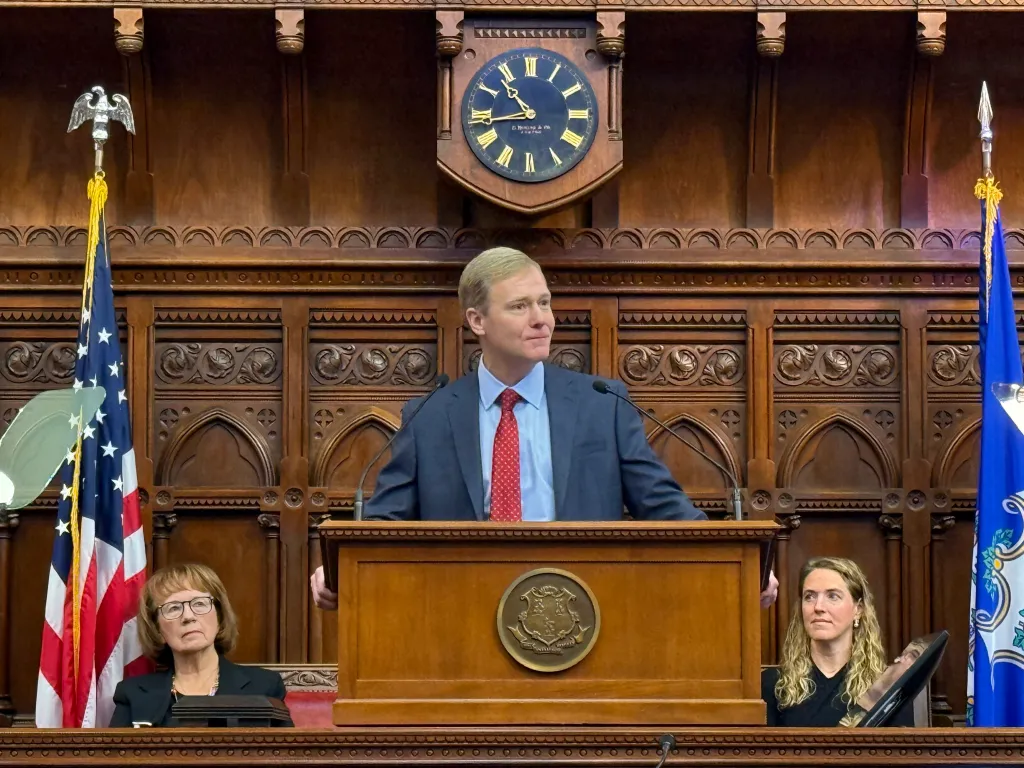
State legislators are preparing for a special session before Halloween but the usual agreements on how to proceed is elusive: Advocates and lawmakers are still battling over state spending, affordable housing, and setting aside money to cover federal budget cuts.
Negotiators have been working on a variety of pending issues, but the final agenda items and the exact date of the session are still to be determined, lawmakers said.
House Speaker Matt Ritter, a Hartford Democrat, said he hopes to have more clarity after a key meeting Friday afternoon with Senate President Pro Tempore Martin Looney and other leaders.
One of the pending items is finalizing the amount of money to prepare in advance for budget cuts from the federal government. Lawmakers have been concerned about the cuts for months, but they still do not know the precise level of the cuts or how long that a shutdown of the federal government might last. With talks stalled in Washington, D.C., the shutdown began Wednesday.
A statewide coalition known as Connecticut For All is calling for lawmakers to reaffirm that they will set aside money to cover federal budget cuts instead of putting that money into the state’s pension funds.
“Without urgent action, Connecticut families will face devastating consequences now: hundreds of thousands could lose health coverage or food assistance, school districts could see millions in federal education cuts, and higher education would become even less accessible as loan and grant restrictions take hold,” the coalition said. “By investing state resources directly into healthcare, child care, housing, and education legislators can shield our communities from these harmful federal rollbacks and ensure Connecticut families are not left behind.”
Lawmakers, Ritter said, need to vote again so that the money is not diverted to the pension funds.
“We’ve always talked about maybe needing that money for a federal protection account,” Ritter told The Courant on Tuesday. “That hasn’t changed. So that’s very consistent with the budget we passed.”
Ritter added, “It would be used certainly to replace federal revenues. You would wait and see where you are. You also have to see what happens with the shutdown. You do need to put it away. If we don’t do something, the treasurer has to put it in the pension fund.”
But House Republican leader Vincent Candelora of North Branford said that lawmakers should stick to the original fiscal guardrails and continue sending the money into the pension fund to strengthen the system. For years, lawmakers said that the pensions for state employees and public school teachers were underfunded. In recent years, Democrats have been saying that more surplus funds should be diverted for increased spending on public education and other needs, but Republicans say that the pensions need additional money because they are still underfunded.
“What’s really going on is there is a clear push to grab the volatility [surplus] money that is due to go into Connecticut’s pension fund by operational law,” Candelora told The Courant on Tuesday. “Generally speaking, Republicans obviously don’t think that’s a good idea when we still have unfunded liabilities that we are paying down with that money. The ultimate goal is to reduce our [regular] payments into the pensions so that we can provide tax relief to the residents of Connecticut, and that’s what our focus should be because middle-class families are hurting from inflation and high taxes.”
While estimates have varied, Candelora says that $674 million in extra “volatility cap” funds would otherwise go into the pension fund, based on state finances. Other estimates have been $500 million to $600 million that represent a portion of the state’s overall budget surplus, lawmakers said.
Brett Cody, the chief spokesman for state treasurer Erick Russell, said Russell “intends to make the volatility transfer after the special session, if one happens, and no later than the end of the year.”
Affordable housing
Republicans, Candelora said, have been largely kept in the dark regarding the items that might be debated during the special session.
“A lot of us are not hearing a lot of information about what may or may not happen in special session,” Candelora said.
More than three months after Gov. Ned Lamont vetoed a controversial housing bill, negotiators still have not announced a final deal on how to move ahead. The much-debated bill on affordable housing was passed by both chambers of the legislature, but Lamont issued his veto in June after saying that local mayors and first selectmen had not been given enough input on the details of the bill.
Two of the most influential lobbying groups at the state Capitol – the Connecticut Conference of Municipalities and the Council of Small Towns – urged Lamont to veto House Bill 5002 because they said it would take away too much local control. Democrats responded that the legislation would not remove local control and was a positive step forward to address the high price of rents and mortgages across the state.
The housing market has remained hot in recent years as many buyers have engaged in bidding wars and thus paid more than the asking price. That includes all levels of housing – from small condominiums in New Haven to single-family homes in Greater Hartford to mansions in Greenwich.
While lawmakers said in June that they would be negotiating with Lamont, Candelora said he has not heard much progress on the housing legislation.
“I continue to hear that the housing bill has not progressed in any direction, so I don’t anticipate that we would be taking it up,” Candelora said.
In addition, lawmakers expect to tackle bipartisan bills that had passed the state House of Representatives by wide margins in the last session but never received votes in the Senate. Those include a major education bill with 30 sections and a children’s mental health bill to increase psychiatric services that had been a high priority for some lawmakers on both sides of the political aisle.
Rep. Tammy Exum, a West Hartford Democrat who co-sponsored the mental health bill, has described the measure as a historic and “transformative piece of legislation that responds directly to the youth mental health crisis, which has been exacerbated by the impacts of the pandemic, presenting itself in the form of increased rates of depression, suicide, and self-harm among adolescents.”
The bills, Ritter said, were derailed by Senate Republican filibusters in the final days of the session, and he is making sure that they come back up for a vote because of bipartisan support in the House.
Christopher Keating can be reached at ckeating@courant.com



